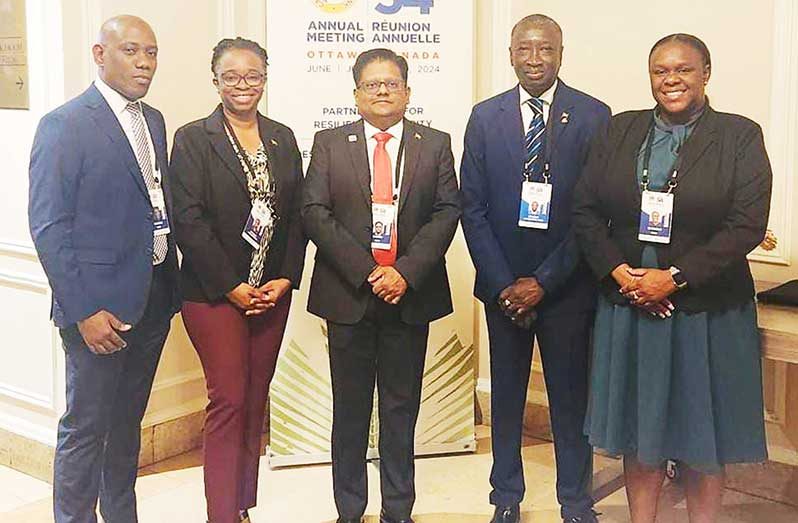–Guyana represented by Dr Singh
SENIOR Minister in the Office of the President with Responsibility for Finance and the Public Service, Dr. Ashni Singh is in attendance at the 54th Annual Meeting of the Board of Governors of the Caribbean Development Bank (CDB) which commenced, on Monday.
The event brought together the bank’s highest decision-making body, through leaders, innovators, academics, business leaders, policymakers, and government officials for vital discussions to address issues pivotal to sustainable development efforts in the Caribbean Region, and concluded on June 20, 2024.
This year’s meeting, which was held in Ottawa Canada under the theme: “Partnerships for Resilient Prosperity,” aimed to advance a common vision to address global threats including climate change.
The meeting was chaired by Canadian Minister of International Development and the current Chairman of the CDB’s Board of Governors, Ahmed Hussen and was attended by over 300 participants from around the world.
During his remarks at the opening ceremony, Minister Hussen recognised the efforts of the President Irfaan Ali-led Government in the area of digitalisation, and alluded to the launch of the One Guyana Digital Skills Initiative Programme in March this year, for which Canada has provided support.
The programme represents a significant investment in the future of Guyanese citizens, empowering them with valuable digital skills and opening doors to exciting employment opportunities in the rapidly evolving tech industry.
It aims to provide digital skills training to over 2,000 Guyanese and upon completion, participants are expected to emerge as full-stack developers, equipped with the skills and knowledge necessary to thrive in the digital landscape.
Digitalisation is one of the top ten areas identified by governors of the region for attention during the next five to ten years.
The other top areas include disaster-prevention, preparedness and emergency response, climate action, capacity building, education, health, environmental protection, renewable energy, digitalisation, water and sanitation and agriculture.
Guyana has been developing at a rapid rate, with the Government of Guyana already focused and implementing a number of programmes and projects in key areas to transform its economy.
It is the country leading CARICOM’s Food Security agenda “25 by 2025” which seeks to reduce CARICOM’s food import-bill by 25 per cent by 2025.
The Government of Guyana also continues to recognise the important role that Guyana’s forest plays in not only the development of the country but in combatting the global impact of climate change.
The government’s Low Carbon Development Strategy 2030 sets out a vision for monetising the climate and ecosystems provided by the standing forest while accelerating the country’s economic development along a low carbon trajectory.
In November 2022, Guyana was issued the world’s first jurisdiction scale carbon credits, following which, in December 2022, the government entered into an agreement for the world’s first sale of such credits in the global carbon market for a minimum payment of US$750 million between and 2022-2032.
This year’s annual meeting focused on the importance of regional and international collaboration as a driving force for sustainable development.
Discussions also focused on gender equality, economic growth, private sector engagement and financing, disaster preparedness and how the financial institution could respond to the call for change as well as support the region’s development goals over the next 10 years in spite of the challenges faced by the region.
Many of the challenges include the region’s continued recovery from the effects of COVID-19 and other global crises such as the war in Ukraine and the Middle East, as well as the devastating impacts of climate change which are likely to intensify.



.jpg)











